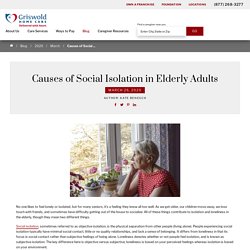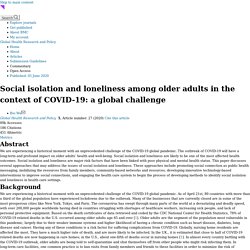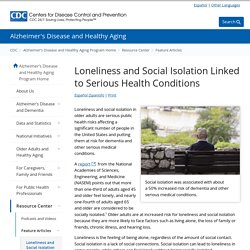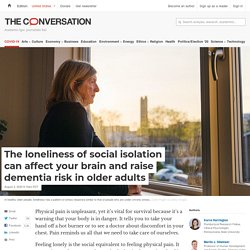

Loneliness and Social Isolation Linked to Serious Health Conditions. Causes of Social Isolation in Elderly Adults. No one likes to feel lonely or isolated, but for many seniors, it’s a feeling they know all too well.

As we get older, our children move away, we lose touch with friends, and sometimes have difficulty getting out of the house to socialize. All of these things contribute to isolation and loneliness in the elderly, though they mean two different things. Social isolation, sometimes referred to as objective isolation, is the physical separation from other people (living alone). People experiencing social isolation typically have minimal social contact, little or no quality relationships, and lack a sense of belonging. It differs from loneliness in that its focus is social contact rather than subjective feelings of being alone. People are considered to be isolated if they live alone, never go out of the house, have no close relatives, never visit anyone, have no contact with neighbors, have no phone, or are alone for more than 9 hours a day.
Download a Free Guide to Home Care Summary. Social Isolation in Older Adults. Seniors felt less socially satisfied, more isolated during Covid-19 circuit breaker period: Survey, Singapore News. SINGAPORE - Social isolation during the circuit breaker period resulted in lower social satisfaction levels for senior citizens, according to results from a monthly survey of about 7,500 people aged between 55 and 75 here.
Social satisfaction levels dipped by about 4 per cent in May when compared with data from January. In particular, for senior citizens living with others, satisfaction levels fell to the pre-circuit breaker levels of peers living alone, while those living alone saw even lower satisfaction levels as safe distancing measures made it more difficult to find support from friends and the community. As of July, while satisfaction levels have rebounded after the circuit breaker period, which was from April 7 to June 1, they are not back to the levels they were at before. As Singapore's population ages, the proportion of those who remain single and live alone will increase, said Prof Straughan, a sociologist and former Nominated Member of Parliament.
Coronavirus: Elderly hit hard by social isolation amid circuit breaker measures, Health News. A needle and the television set - these two objects have been keeping 83-year-old Nellie Woo company from morning to night for the past week while she is holed up alone at home. She used to enjoy playing bingo and exercising with her elderly neighbours at the Senior Activity Centre (SAC) downstairs, as well as chatting with volunteers who visited her studio flat.
Now that all activities for seniors - including home visits - have ceased due to strict circuit breaker measures, Madam Woo is feeling lonely and emotionally down. She thinks about suicide sometimes, and has spent so much time staring at her patchwork and TV lately that her doctor had to give her antibiotics for dry eyes. For such elderly people, the ills that come with social isolation pose a significant health risk, say some seniors and social workers. Out of the 208,000 people who live alone in Singapore, at least a quarter of them are elderly.
In 2016, there were 47,000 seniors aged 65 and above who lived by themselves. Social isolation and loneliness among older adults in the context of COVID-19: a global challenge. Social isolation is defined as the objective state of having few social relationships or infrequent social contact with others while loneliness is a subjective feeling of being isolated.

Social isolation and loneliness are serious yet underestimated public health risks that affect a significant portion of the older adult population. In the U.S., approximately one-quarter of community-dwelling older adults are considered to be socially isolated, and 43% of them report feeling lonely [2]. The COVID-19 pandemic is increasing the number of older adults who are socially isolated including both community-dwelling older adults and nursing home residents, as many countries have issued stay-at-home orders and banned visits for nursing home residents.
Loneliness and Social Isolation Linked to Serious Health Conditions. Social isolation was associated with about a 50% increased risk of dementia and other serious medical conditions.

The loneliness of social isolation can affect your brain and raise dementia risk in older adults. Physical pain is unpleasant, yet it’s vital for survival because it’s a warning that your body is in danger.

It tells you to take your hand off a hot burner or to see a doctor about discomfort in your chest. Pain reminds us all that we need to take care of ourselves. Feeling lonely is the social equivalent to feeling physical pain. It even triggers the same pathways in the brain that are involved in processing emotional responses to physical pain. Just like feeling physical pain, feeling lonely and disconnected from others is also a signal that we need to take care of ourselves by seeking the safety and comfort of companionship. As scholars at the Center for Healthy Aging at Penn State, we study the impact of stress on the aging body and brain, including how it can worsen cognitive decline and risk for dementia.
The health consequences of loneliness The COVID-19 pandemic has put many older adults’ social lives on hold, leaving them at greater risk for loneliness. Impact of social relationships on Alzheimer’s memory impairment: mechanistic studies.